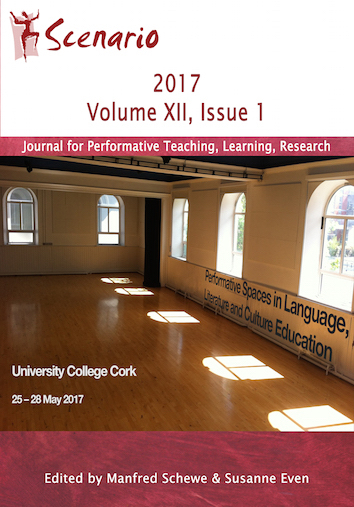Virtual Frontiers: How Online Spaces are Redefining the Value and Viability of Performative Foreign Language Learning
DOI:
https://doi.org/10.33178/scenario.11.1.7Abstract
This paper will seek to contrast the rapidly growing commercial industry of digitally-mediated foreign language education with the gradually diminishing support for foreign language programs in American universities. After first analyzing evidence that justifies the need for foreign language education at the university level, it then digs deeper to locate the characteristics of those most successful online classroom models. It will finally draw on theories of language, teaching, and performativity in an effort to explore how digital spaces have and will shape the relationship between instructor and student and the performance of foreign language learning.References
An, Yun Jo, & Reigeluth, Charles M. (2008): Problem-based learning in online environments. In: Quarterly Review of Distance Education 9/1, 1-16
Ball, Stephen J. (2004): Education for Sale! The Commodification of Everything? King’s Annual Education Lecture. http://www.asu.edu/educ/epsl/CERU/articles/CERU-0410-253-OWI.pdf [last accessed June 6, 2017]
Boorstin, Julia (2014): High-tech Tutoring: Big Media, Big Start-ups & Big Money. http://www.cnbc.com/2014/08/29/high-tech-tutoring-big-media-big-start-ups-big-money.html [last accessed June 9, 2017]
Cormier, Dave (2010): What is a MOOC? Online video clip. YouTube. YouTube, 8 Dec. 2010. https://www.youtube.com/watch?v=eW3gMGqcZQc [last accessed June 15, 2017]
Daniel, Shirley J.; Xie, Fujiao & Kedia, Ben L. (2014): 2014 Business Needs for Employees with International Expertise. In: The Future of International and Foreign Language Studies conference, Williamsburg, VA, April 11-13, 2014
Elstrom, Peter & Ramli, David (2006): If the U.S. Won’t Pay Its Teachers, China Will. Bloomberg News. https://www.bloomberg.com/news/articles/2016-12-19/if-the-u-s-won-t-pay-its-teachers-china-will [last accessed June 4, 2017]
Flemming, Arthur S. (1960): The Philosophy and Objectives of the National Defense Education Act. In: The Annals of the American Academy of Political and Social Science 326, 132-138
Heller, Nathan (2013): Laptop U. In: The New Yorker. http://www.newyorker.com/magazine/2013/05/20/laptop-u [last accessed May 13, 2017]
High, Peter (2013): Lessons from the CEO of the First Ever MOOC. Forbes. https://www.forbes.com/sites/peterhigh/2013/12/31/lessons-from-the-ceo-of-the-first-ever-mooc/#79b446cc4380 [last accessed June 10, 2017]
Hua, Zhu (2014): Exploring Intercultural Communication: Language in Action. Milton Park: Routledge
Khalil, Hanan & Ebner, Martin (2014): MOOCs Completion Rates and Possible Methods to Improve Retention - A Literature Review. In: Proceedings of World Conference on Educational Multimedia, Hypermedia and Telecommunications 2014. https://www.researchgate.net/publication/306127713_MOOCs_completion_rates_and_possible_methods_to_improve_retention-A_literature_review [last accessed May 19, 2017]
King, Alison (1993): From Sage on the Stage to Guide on the Side. In: College Teaching 41/1, 30-35
Kuo, Yu-Chun; Walker, Andrew E.; Belland, Brian R. & Schroder, Kerstin E. E. (2013): A Predictive Study of Student Satisfaction in Online Education Programs. In: The International Review of Research in Open and Distributed Learning 14/1. http://www.irrodl.org/index.php/irrodl/article/view/1338/2416 [last accessed May 20, 2017]
Lunden, Ingrid (2016): VIPKID Nabs $100M to Link Chinese Kids with Native Speakers to Learn English. https://techcrunch.com/2016/08/03/vipkid-nabs-100m-to-link-chinese-kids-with-native-speakers-to-learn-english/ [last accessed June 4, 2017]
Maas, Steve (2017): Do Online Courses Increase Access to Education? PBS NewsHour: Making Sen$e. http://www.pbs.org/newshour/making-sense/online-courses-increase-access-education/ [last accessed June 17, 2017]
McCue, TJ. (2014): Online Learning Industry Poised for $107 Billion in 2015. Forbes. https://www.forbes.com/sites/tjmccue/2014/08/27/online-learning-industry-poised-for-107-billion-in-2015/#7c775ee87103 [last accessed May 17, 2017]
McKenzie, Jon. (2001): Perform or Else: From Discipline to Performance. London and New York: Routledge
Nemo, John (2016): The $107 Billion Industry That Nobody’s Talking About. https://www.inc.com/john-nemo/the-107-billion-industry-that-nobodys-talking-about.html [last accessed June 4, 2017]
Newton, Deborah (2014): Shifting Perspectives and Collapsing Binaries: Critical Performative Pedagogy in the Performance Studies Classroom. In: Scenario 8/2, 17-11
Prendergast, Monica (2008): Teacher as Performer: Unpacking a Metaphor in Performance Theory and Critical Performative Pedagogy. In: International Journal of Education & the Arts 9/2, 1-19. http://www.ijea.org/v9n2/v9n2.pdf [last accessed June 14, 2017]
Rivard, Ry (2013): Udacity Project on ‘Pause’. Inside Higher Ed. https://www.insidehighered.com/news/2013/07/18/citing-disappointing-student-outcomes-san-jose-state-pauses-work-udacity [last accessed June 4, 2017]
Schewe, Manfred (2013): Taking Stock and Looking Ahead: Drama Pedagogy as a Gateway to a Performative Teaching and Learning Culture. In: Scenario 7/1, 5-23
Smith, Frank D. (2017): Who Is the Average Online College Student [#Infographic]. https://edtechmagazine.com/higher/article/2014/05/who-average-online-college-student-infographic [last accessed June 1, 2017]
State of the MOOC (2016): Online Course Report. http://www.onlinecoursereport.com/state-of-the-mooc-2016-a-year-of-massive-landscape-change-for-massive-open-online-courses/ [last accessed June 17, 2017]
The Big Three, At a Glance (2012). The New York Times. http://www.nytimes.com/2012/11/04/education/edlife/the-big-three-mooc-providers.html [last accessed June 1, 2017]
U.S. Department of Education, National Center for Education Statistics (2016): Digest of Education Statistics, 2015 (NCES 2016-014), Chapter 3
Wan, Tony (2017): The Asian Money Fueling US Edtech Investments. EdSurge. https://www.edsurge.com/news/2017-04-26-the-asian-money-fueling-us-edtech-investments [last accessed May 17, 2017]
Woo, Younghee & Reeves, Thomas C. (2007): Meaningful Interaction in Web-Based Learning: A Social Constructivist Interpretation. In: Internet and Higher Education 10/1, 15-25
Zhenghao, Chen; Alcorn, Brandon; Christensen, Gayle; Eriksson, Nicholas; Koller, Daphne & Emanuel, Ezekiel J. (2015): Who’s Benefiting from MOOCs, and Why. In: Harvard Business Review. https://hbr.org/2015/09/whos-benefiting-from-moocs-and-why [last accessed May 20, 2017]
Published
Issue
Section
License
Copyright (c) 2017 the author(s)

This work is licensed under a Creative Commons Attribution-NonCommercial-NoDerivatives 4.0 International License.







